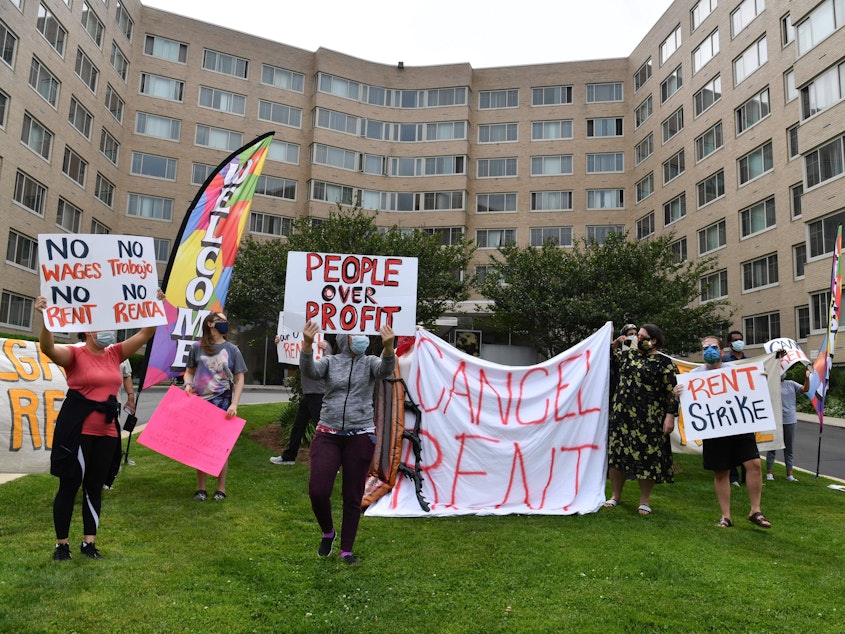'It's Like A Nightmare': Options Dwindle For Renters Facing Economic Distress

As one of the country's worst economic and health crises in history deepens, rent is due again for millions of people who are struggling to make ends meet.
Over the last few months, states and the federal government have taken steps to help tenants who've lost their jobs. Now, while the unemployment rate is still climbing, some of the protections for renters are running out.
An extra $600 a week in unemployment benefits for eligible people is set to expire at the end of July, for instance.
In March, Elaine Slikkerveer lost her job teaching art for a nonprofit in Reno, Nev., a result of the coronavirus pandemic. Now, the single mother of two is struggling to pay the rent and has had to consider uprooting her family from the condo they rented for 10 years.
"I have anxiety, I can't sleep," 51-year-old Slikkerveer says.
In order to make her April and May rent, she stopped making payments on other bills, used her government relief checks, and dug into her savings. When she reached out to her landlord to discuss June rent, she says that he was not understanding and insisted she needed to pay.
Last week, Slikkerveer's landlord, John Burkett, told NPR: "I sympathize with Elaine's current situation and am working with her to ease the stress," adding that "rental income is my only income so this is definitely putting a burden on me as well."
In the end, Slikkerveer says that Burkett agreed to waive her late fee and figure out a payment plan.
Slikkerveer says that six months ago, she could never have imagined being in a situation like this.
"I never dream about it. And to be honest with you, it's like a nightmare. It's a lot of uncertainty," she says. "I was planning, had everything planned. And nothing in my plan is working. I mean, I have nothing right now."
As tenants across the country run out of options, more and more are turning to credit cards to pay the rent.
Property management company Zego processes millions of rent checks every month.
From March to April, they reported that the number of tenants putting rent on a credit card increased 30%; from April to May, it went up another 20%
As of now, about half the states in the U.S. are allowing evictions, according to Emily Benfer of Columbia Law School, who has been tracking state policies around COVID-19 and housing.
Benfer called COVID-19 "a great magnifier of inequity and health injustice across our country." She says that people of color are evicted at higher rates than white people, especially mothers with kids.
"Today, the net worth of a typical white family is nearly 10 times greater than that of a black family," Benfer says. "We can expect this divide to widen as COVID-19 mortality and job loss continues to affect communities of color at a higher rate than other groups."
Some places, such as Kansas City, Mo., are conducting remote eviction hearings by phone or videoconference — effectively deciding that while it's not safe enough to show up in court, it is safe enough to evict someone from their home.
Over the last couple months, there hasn't been a steep drop off in the numbers of people paying rent. The question is what will happen in the next few months.
"We're watching a tidal wave move forward towards us and across the state," says Lee Camp, an attorney with ArchCity Defenders, in St. Louis, Mo., a nonprofit organization that represents tenants.
He says that the group's phones have been flooded with calls from people seeking housing assistance. As the state reopens and evictions resume, he predicts that tidal wave could be "all-consuming for the next few months, if not years."
There are some variables that will help determine how massive that wave will be. For instance, if Congress doesn't pass an extension on the extra unemployment benefits, tens of millions more renters could be in trouble.
Before the wave of protests against police violence started, activists around the country were holding rallies to "cancel the rent."
Ale Lomanto helps organize demonstrations in Philadelphia.
"I feel for my community and my neighbors who have to choose between putting food on the table and housing," says Lomanto, 26. "And then also putting themselves at risk to work."
Lomanto owned a pet care business in West Philadelphia before shutting it down in March. Lomanto, who uses the pronoun they, doesn't know how they're going to pay rent for June. They sublet an apartment that's managed by a company named New Age Realty and is among the 300 tenants petitioning for the suspension of rent payments during the pandemic.
Lance Roger, a real estate lawyer who represents the New Age Realty Group, offers the landlord perspective.
"A lot of these properties are owned by investors, and these are hard-working men and women who are investing for their future," he says. "So what they've done is gone out and gotten mortgages, and when the tenants decide en masse they don't want to pay their rent, it's going to impact the ability for the landlords to make their mortgage payments."
And if more and more mortgages go unpaid, Rogers says, it could have a domino effect with broader impacts on the economy.
In 2008, the financial collapse hit homeowners more than it did renters — but the ripples spread beyond mortgage holders.
This time, if tenants across the country can't pay the rent, the ripples could reach far beyond the rental market. [Copyright 2020 NPR]
